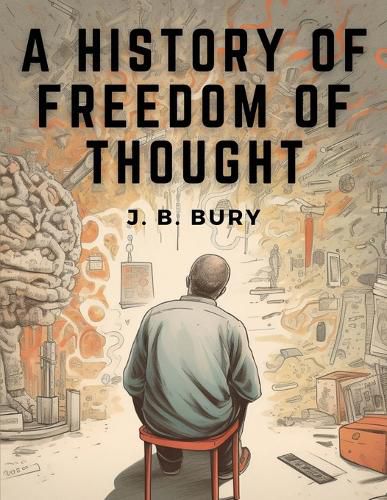Readings Newsletter
Become a Readings Member to make your shopping experience even easier.
Sign in or sign up for free!
You’re not far away from qualifying for FREE standard shipping within Australia
You’ve qualified for FREE standard shipping within Australia
The cart is loading…






This title is printed to order. This book may have been self-published. If so, we cannot guarantee the quality of the content. In the main most books will have gone through the editing process however some may not. We therefore suggest that you be aware of this before ordering this book. If in doubt check either the author or publisher’s details as we are unable to accept any returns unless they are faulty. Please contact us if you have any questions.
Most people who live in open societies, especially in the West, take freedom of thought and the right to express that thought for granted. But through most of history, independent thinking, outside of the framework of social or religious convention, was discouraged and often actively persecuted.
It is only recently that rational critiques of traditional perspectives have become an accepted part of public discourse. The struggle for independence of mind was many centuries in the making and involved repression, bloodshed, and martyrdom as well as breakthrough discoveries and heroic individuals who changed the way we look at the world, many times at risk to their own lives.
One of the best surveys of this dramatic intellectual history is J. B. Bury's Freedom of Thought. With striking eloquence and clarity of expression, Bury succinctly describes the struggle of reason in the search for truth from ancient times to the beginning of the 20th century.
He leads the reader from the amazing florescence of rational inquiry in classical Greece, through the eclipse of free thought under the sway of religious authority during much of the Middle Ages, to the rediscovery of Greco-Roman philosophy in the Renaissance, and finally to the growth of rationalism during the Enlightenment and the scientific revolution.
Along the way, Bury elucidates the key events that contributed to the modern rational comprehension of nature. He also provides thumbnail sketches of the many important persons--philosophers, scientists, and writers--who championed independent thinking and laid the groundwork for contemporary Western culture.
Though written more than ninety years ago, this erudite yet very accessible intellectual history should be on the bookshelves of everyone who values reason and independent thinking.
$9.00 standard shipping within Australia
FREE standard shipping within Australia for orders over $100.00
Express & International shipping calculated at checkout
This title is printed to order. This book may have been self-published. If so, we cannot guarantee the quality of the content. In the main most books will have gone through the editing process however some may not. We therefore suggest that you be aware of this before ordering this book. If in doubt check either the author or publisher’s details as we are unable to accept any returns unless they are faulty. Please contact us if you have any questions.
Most people who live in open societies, especially in the West, take freedom of thought and the right to express that thought for granted. But through most of history, independent thinking, outside of the framework of social or religious convention, was discouraged and often actively persecuted.
It is only recently that rational critiques of traditional perspectives have become an accepted part of public discourse. The struggle for independence of mind was many centuries in the making and involved repression, bloodshed, and martyrdom as well as breakthrough discoveries and heroic individuals who changed the way we look at the world, many times at risk to their own lives.
One of the best surveys of this dramatic intellectual history is J. B. Bury's Freedom of Thought. With striking eloquence and clarity of expression, Bury succinctly describes the struggle of reason in the search for truth from ancient times to the beginning of the 20th century.
He leads the reader from the amazing florescence of rational inquiry in classical Greece, through the eclipse of free thought under the sway of religious authority during much of the Middle Ages, to the rediscovery of Greco-Roman philosophy in the Renaissance, and finally to the growth of rationalism during the Enlightenment and the scientific revolution.
Along the way, Bury elucidates the key events that contributed to the modern rational comprehension of nature. He also provides thumbnail sketches of the many important persons--philosophers, scientists, and writers--who championed independent thinking and laid the groundwork for contemporary Western culture.
Though written more than ninety years ago, this erudite yet very accessible intellectual history should be on the bookshelves of everyone who values reason and independent thinking.